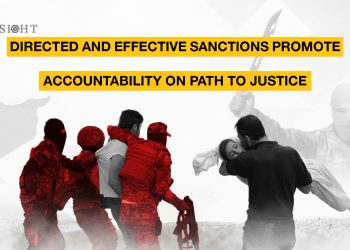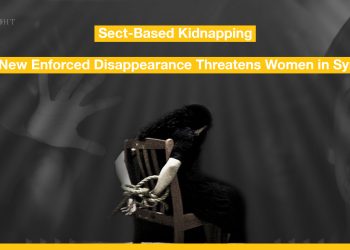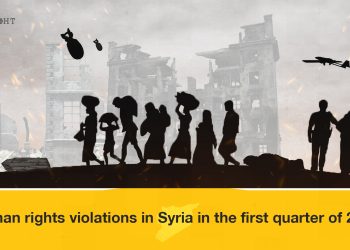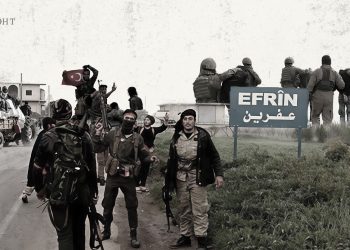A new conflict has erupted on the Syrian coast since Thursday, March 6th, between new Syrian government forces and armed groups supporting former president Bashar al-Assad’s regime, resulting in mass killings, looting and widespread violations.
INSIGHT monitored the killing of 500 civilians on the Syrian coast on March 6th, 7th and 8th of 2025, mostly from the Alawite community, and a few from Sunnis, Christians and Kurds.
The events began when government “public security” patrols and barriers in Latakia’s countryside were attacked and ambushed, resulting in military and civilian deaths, according to official government statements that announced security operations against “remnants of the former regime”.
Continued bloody escalation on Friday and Saturday led to the killing of Transitional Government members. The new Syrian government forces, newly joined factions and irregular armed groups that supported it patrolled the villages, towns and neighborhoods of Syria’s coast, and carried out large-scale mass killings, arrests and looting in entire neighborhoods and villages.
The Government’s security forces and its supporters committed numerous massacres and panicked the people in the area of operations, which included Latakia, Jableh, Tartus, Banias and countryside of Hama.
INSIGHT reached out to witnesses, victims and activists in the Syrian coast, who reported the killings mentioned in this briefing, including the numbers of victims our team was able to document, and the names of villages and neighborhoods where massacres of civilians took place on March 6th, 7th and 8th, 2025.
The practices of the Ministry of Defense’s forces and its supporting factions are a flagrant breach of international humanitarian and human rights law and amount to a war crime.
Mass Killing
The new government’s troops and armed groups committed mass massacres against whole families, some of which amounted to six victims, and men and youth were frequently gathered in several villages and towns, taken to a square and executed collectively.
The total number of civilian victims killed during Thursday, Friday and Saturday, and documented by INSIGHT was 500, namely 424 men, 51 women and 25 children.
The majority of the killings were carried out on the basis of sectarian identity (against Alawites), and the victims were doctors, engineers, academics, clergy and university students, some of whom were opposed to the Assad regime and others who were guilty only of living or being in an area where armed conflict had erupted.
An activist in the Jableh said that “systematic decimation has taken place based on the identity, and the snipers scattered on the rooftops have killed all those who moved in.”
He added that, in addition to the civilian deaths, the displacement of families into mountains, property looting, and the trespassing, “anyone who was a military member of the former regime, even if he made a settlement, was immediately decimated or severely beaten in front of his children, his property stolen, his house shot and destroyed”, according to the journalist.
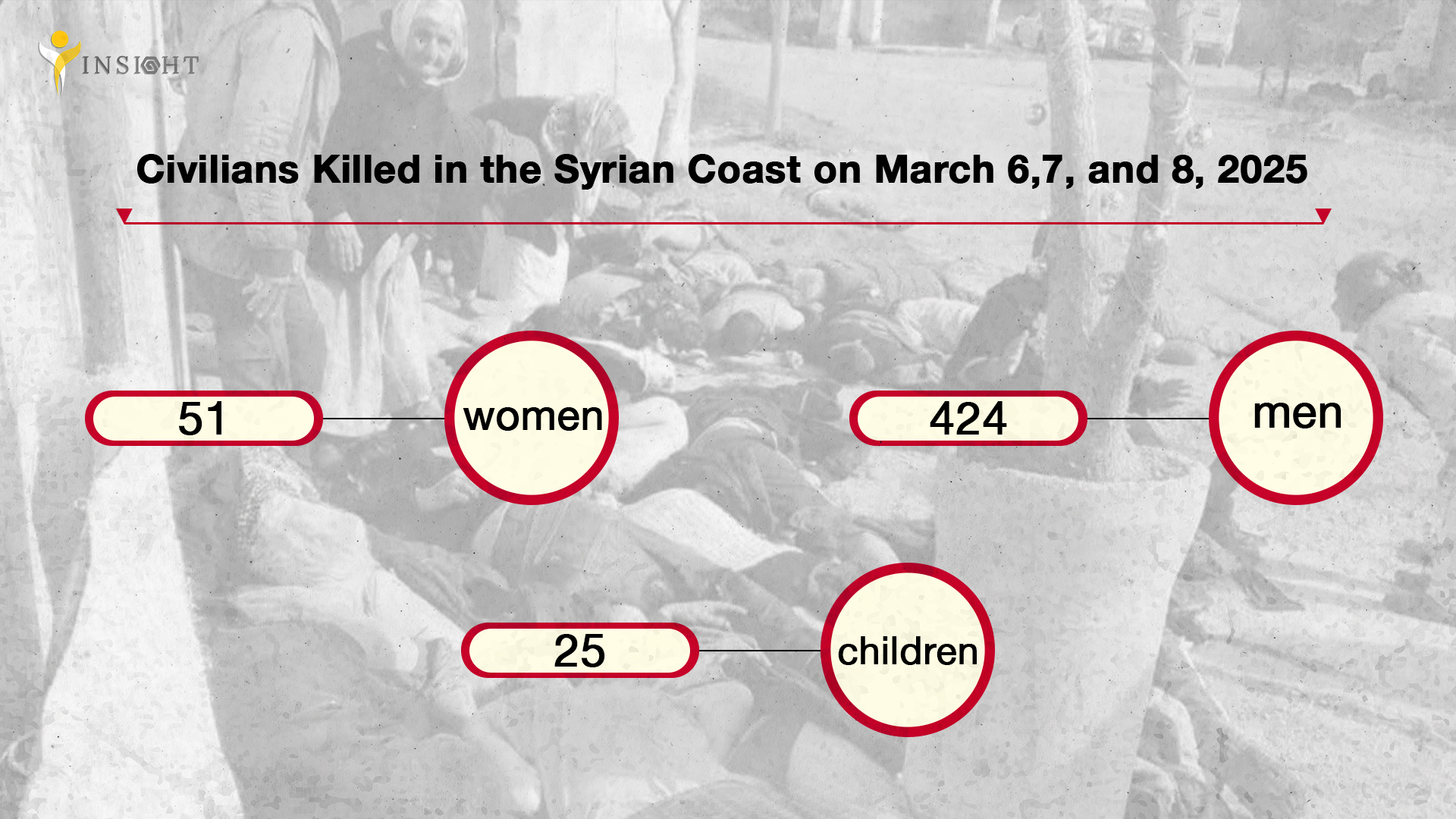
“They killed all the men in ‘al-Sunobar’ village, and nobody could bury them,” says another witness who lives abroad and communicates with her female neighbors in countryside of Jableh.
In other incidents, no distinction has been made between men, women, children and the elderly. In some cases, all family members were killed, a witness in Banias said: “My niece, her husband and her young sons were murdered.”
According to data collected by INSIGHT, 27 doctors and pharmacists, 4 sick and disabled children, a worker with UNRWA and others university students and retirees who could not be accused of taking part in hostilities against the Government’s security forces, were killed.
During the operations, groups considered part of the Transitional Government forces committed practices contrary to human dignity and carried out extensive arrests without charges or information about the arrestees, who were guilty only of being Alawites.
Local activists estimated that thousands of persons were displaced, and injured people have been unable to access medical care, amid road outages to hospitals, power outages in Latakia and widespread looting.
On Saturday, March 8th, the Ministry of Defense blocked roads and installed roadblocks to reduce the extensive looting of property, which according to witnesses included money, cars and furniture.
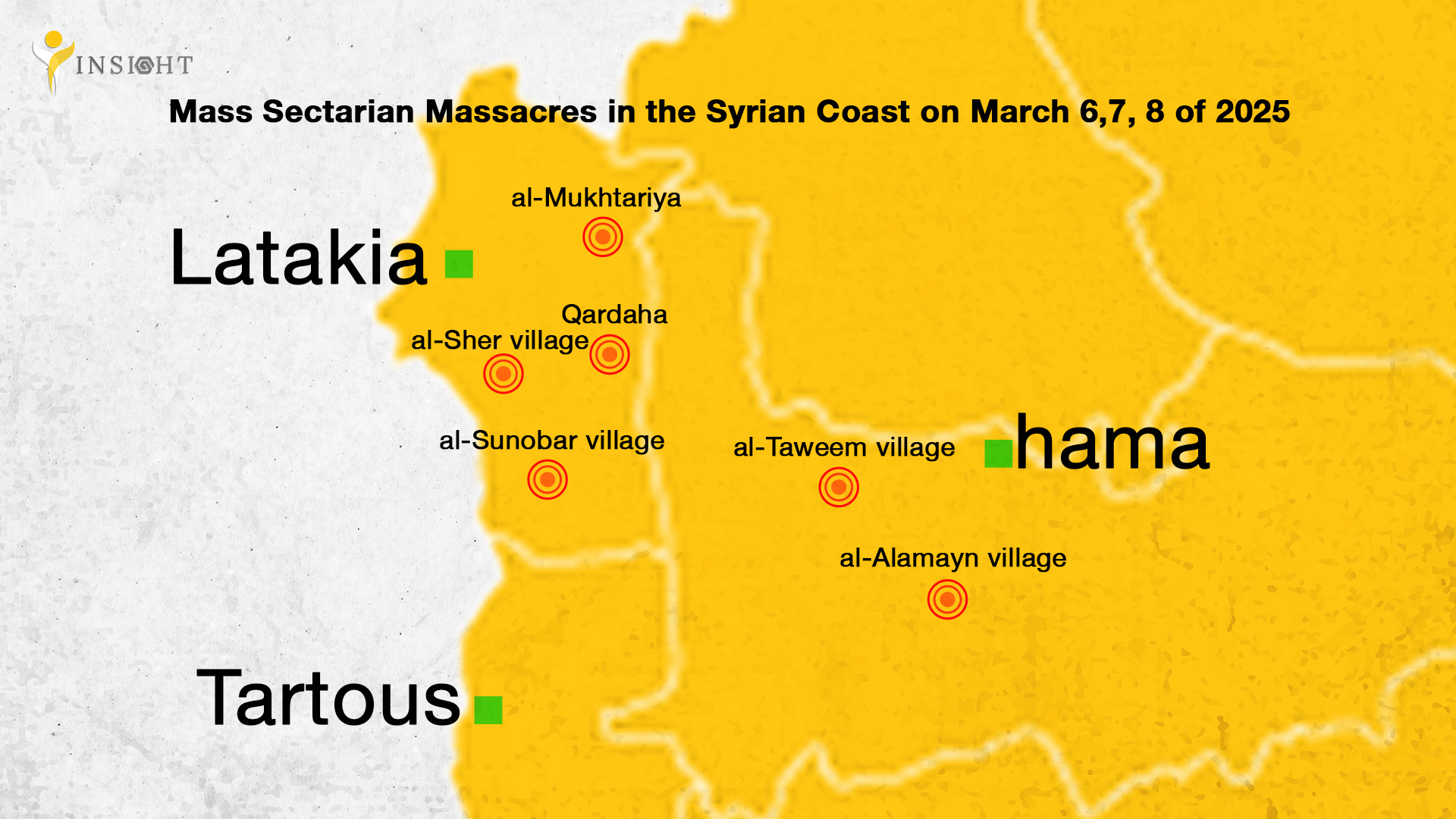
Hatred and resentment
The people in Alawite majority areas are panicked over the continuing massacres. A witness said that they feel as they were in a queue to face murder with their families.
Hate speeches and calls for hostility and reprisals among Syrians have soared, and calls of a sectarian nature have emerged through loudspeakers of mosques in several regions of Syria and during solidarity with government forces.
INSIGHT saw videos of militants committing killings or expressing with pro-Government media their joy at merciless hostilities, amid the absence of any influence of the wise people’s voices on combat leaders and decision centers.
The Ministry of Defense in Damascus announced it sat up a committee to monitor violations and breaches of its instructions during operations in the Syrian Coast and to refer perpetrators to the military court, but activists said violations continued in Alawite towns and villages.
Legal and political professionals warn of the consequences of massive violations and reprisals that do not discriminate between armed men and innocent civilians, including the country’s unity, the future of the new Government and its ability to maintain civil peace.
In an earlier report, INSIGHT warned that hate speech after the fall of the Assad regime threatened to undermine civil peace and indicated that there was a real and imminent risk of genocide or similar crimes. The organization called on communities to promote tolerance between religious and ethnic communities and leave accountability to official judicial authorities, which we call upon to strengthen their efforts and mechanisms to hold perpetrators accountable and to bring justice to victims of crimes and violations and their relatives.
A member of INSIGHT documentation team in the Syrian Coast said on Saturday during his presentation of the statements to colleagues that he was in pain because he was responding to survivors of victims, fleeing to the mountains and forests of the coast and also threatened with death: “God help you, and we do nothing but to document these violations.”
Who is responsible?
There is no doubt that the former Syrian regime and its president, Bashar al-Assad, are responsible for conferring sectarianism on the crimes that he has committed for decades, and what is happening today as a result of sowing division and hatred among the Syrian components. Justice requires that the regime’s head and pillars be held accountable.
The declarers of the war against the new Government also are responsible for the military and civilian casualties and the outbreak of a new conflict that led to widespread violations, most notably Mekdad Fatiha, Ghayath Dalla, Suheil al-Hassan, and Ibrahim Hweja (who was arrested) must be held accountable on their war crimes against Syrians.
The new Syrian authorities are responsible for the violations and holding the perpetrators accountable, because it had sent uncontrolled factions and groups to the Syrian coast and allowed for collective reprisals.
Although the security operation by the Transitional Government’s forces were a respond to attacks and ambushes, the inclusion of all groups in the war was disproportionate to what had happened. The weapons (bullets, missiles, guns, drones and warplanes) and the size of the targeted areas were not commensurate with the crackdown of certain groups.
The attackers deployed in the area without specific military positions and retreated to the mountains during the second day of clashes, the authorities did not have to carry out these large-scale operations and convey sectarian groups to achieve a security victory and arrest those wanted.
International humanitarian law stipulates the principle of distinction in military operations between civilians and military personnel, but this principle has been repeatedly breached in multiple places during military operations in the Syrian Coast, which resulted in civilian casualties.
The Government is responsible for the safety of its citizens, even if they are in a conflict zone outside its influence, and must be the initiator of solutions that guarantee civil peace and stability rather than contributing to undermining it.
The committed crimes amounted to war crimes and crimes against humanity, and certain provisions of the definition of genocide applied to them.
The authorities made positive strides when President Ahmed Al-Shara’ called for the “protection of civilians, and forbid any one of further overreacting”, and the announcement by the Ministry of Defense of a committee to investigate violations and bring the perpetrators to trial.
A witness in Latakia city said that the factional situation was obivious during the operations, “They did not integrate, and many of the events spread on media as clashes between public security and remnants of the regime, were actually between “public security” (government) and the newly engaged factions of the new Syrian army.”
One of the events was a clash on March 8th, at the ‘officers’ club’ in Latakia between ‘public security’ forces and factions joining government forces.
Many people, especially in the countryside, had tried to object to any one entering their villages, “because they had seen savage members killing any breathing creature.”
However, the Ministry of Defense is responsible for holding the perpetrators of violations of all factions under its control that participated in the “Victory Conference” held on January 29th, accountable. That includes the Suleiman Shah, Hamza and Ahrar-e-Sharqiya factions, which have a full record of crimes and violations in north Syria and whose leaders hold senior positions in the new Syrian Army.
The ministry is also responsible for the practices of foreign combatants among its formations who have been characterized by strict religious discourses, as well as armed civilian groups who have joined the Ministry’s operation.
The Legal frame
Armed conflicts undergo international humanitarian and human rights law, which aims to protect civilians and their property and ensure accountability for serious crimes. The violations that occurred during the events in the Syrian coast and the models in the report amount to war crimes, crimes against humanity and, possibly, genocide, according to the international legal framework.
- Mass murder and genocide
The Convention on the Prevention and Punishment of the Crime of Genocide (1948) stipulates that “genocide means any of the following acts committed with intent to destroy, in whole or in part, a national, ethnical, racial or religious group, as such: killing members of the group and causing serious bodily or mental harm to members of the group”
Article 6 of the Rome Statute defines genocide as “acts committed with intent to destroy, in whole or in part, a group, as such: killing members of the group and causing serious bodily or mental harm to members of the group
Mass killings based on sectarian identity reported in the report may fall under these provisions, especially that specific groups were targeted based on their sectarian affiliation.
- Targeting civilians according to international humanitarian law
- Targeting civilians in armed conflict is a grave breach of the four Geneva Conventions of 1949 and Additional Protocol I of 1977, whereby these treaties oblige parties to the conflict to distinguish between military objectives and civilians.
- Article 8 of the Rome Statute of the International Criminal Court stipulates that ‘ “war crimes” means: Intentionally directing attacks against the civilian population as such or against individual civilians not taking direct part in hostilities”.
- The report’s statement that men and youth have been decimated on the basis of identity and that entire families have been killed is a breach to the principle of the Protection of Civilian Persons.
- Prevention of sectarian and ethnic discrimination in conflicts
The Universal Declaration of Human Rights (1948) and the International Covenant on Civil and Political Rights (1966) prohibit discrimination on the basis of religion, race or national origin.
The International Agreement on the Elimination of All Forms of Racial Discrimination (1965) also stipulates that any policies or actions targeting a particular group on the basis of identity must be prohibited.
Reprisals against the population of the Syrian coast, documented by INSIGHT, violate this principle and reinforce sectarian violence, undermine civil peace and continue the violence.
- The state responsibility for the prevention of crimes and the punishment of perpetrators
According to the principles of the Responsibility to Protect (R2P): “all Heads of State and Government affirmed the responsibility to protect populations from genocide, war crimes, ethnic cleansing and crimes against humanity”. If it fails, the international community can intervene as stipulated by the United Nations.
The new Syrian authorities are responsible for preventing their forces and affiliated factions from committing violations, and ensuring that those responsible for the massacres and attacks are held accountable.
The Ministry of Defense announced the establishment of a committee of inquiry that would not absolve the Government of its legal responsibility to protect civilians and prevent armed factions from carrying out uncontrolled reprisals.
- Looting and unjustified destruction of property
The Geneva Conventions (Article 33 of Convention IV) stipulates that: “Collective penalties, pillage, and reprisals against protected persons and their property are prohibited”.
Looting and indiscriminate destruction are also breach of article 8 of the Rome Statute, which prohibits “Destroying or seizing the property of an adversary unless such destruction or seizure be imperatively demanded by the necessities of the conflict”.
The report on the looting of property, including money, cars and furniture, constitutes a clear violation of these laws.
- Prevention of arbitrary detaining and enforced disappearances
The Convention against Torture (1984) and the International Covenant on Civil and Political Rights prohibit arbitrary arrests, and oblige States to ensure detainees’ safety and non-torture or enforced disappearance.
The collective arrests of civilians carried out by government forces without clear charges, according to the report, constitute a violation of these provisions.
- Prohibition of hate speech and incitement to violence
The Convention on the Prevention of the Crime of Genocide provides that public and direct incitement to commit genocide is punishable by law.
Sectarian hate speech, spread through loudspeakers and the media, is a motive for violence and leads to further sectarian escalation.
The Government must take effective action to prevent the spread of this discourse and ensure that military forces and armed factions do not incite sectarian violence.
The Government must take effective action to prevent the spread of this discourse and ensure that military forces and armed factions do not incite sectarian violence.
Based on the mentioned international laws and customs, violations committed in the Syrian coast require independent international investigation and accountability of those responsible. The international community must take steps to ensure that there is no impunity, and the new Syrian Government must hold its legal and moral responsibilities to stop these atrocities and prevent their recurrence.
Holding perpetrators accountable under international law is not only a need for justice, but also a vital step to prevent the breakdown of civil peace and to prevent further crimes against civilians.
Recommendations:
to the current government:
– To declare a cessation of general military action in the Syrian Coast and to replace it with arrest and fair trials of those responsible for attacking the security forces and civilians.
– To establish an independent commitee of inquiry on violations and to hold all perpetrators and all parties seriously accountable, and to dissolve or fully integrate elements of uncontrolled factions so that violations do not become an approach to the new Syrian army.
– Ensure property rights, dignity and respect for human rights during security operations and arresting wanted persons.
– To begin urgent steps to rebuild trust between Syrian communities and political parties, and to abandon the one approach that has overshadowed the ‘Victory Conference’ and the ‘National Dialogue Conference’, in order to avoid the collapse of the Government, dividing the country, or external interference.


